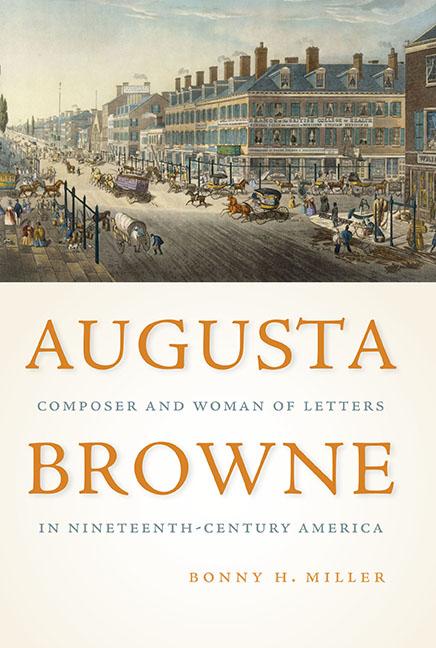Book contents
- Frontmatter
- Contents
- List of Illustrations
- Preface
- Acknowledgments
- Introduction
- 1 First Steps
- 2 Apprentice in a Family Music Business
- 3 Philadelphia Debut
- 4 A Young Professor of Music
- 5 A New Leaf
- 6 Her Own Woman
- 7 Courtship and Consequences
- 8 Pilgrim in Progress
- 9 “Glad Fruition”
- 10 Legacy in Music
- 11 Legacy in Literature
- 12 Contributions to Music Journalism
- 13 A Legacy Written into History
- Appendixes
- Appendixe 1 Children and Descendants of David Samuel Browne and Elizabeth Montgomery Browne
- Appendixe 2 Chronology of Augusta Browne’s Music and Letters
- Appendixe 3 List of Musical Works
- Appendix 4 Selected Glossary
- List of Abbreviations
- Notes
- Selected Bibliography
- Index
- Frontmatter
- Contents
- List of Illustrations
- Preface
- Acknowledgments
- Introduction
- 1 First Steps
- 2 Apprentice in a Family Music Business
- 3 Philadelphia Debut
- 4 A Young Professor of Music
- 5 A New Leaf
- 6 Her Own Woman
- 7 Courtship and Consequences
- 8 Pilgrim in Progress
- 9 “Glad Fruition”
- 10 Legacy in Music
- 11 Legacy in Literature
- 12 Contributions to Music Journalism
- 13 A Legacy Written into History
- Appendixes
- Appendixe 1 Children and Descendants of David Samuel Browne and Elizabeth Montgomery Browne
- Appendixe 2 Chronology of Augusta Browne’s Music and Letters
- Appendixe 3 List of Musical Works
- Appendix 4 Selected Glossary
- List of Abbreviations
- Notes
- Selected Bibliography
- Index
Summary
Augusta Browne was a Star from the Start, According to the Description of a “little prodigy” in Boston newspapers during October 1826. Bostonians were “astonished at the style in which a daughter of Mr. Browne’s, a child of little more than seven,” played a “most difficult composition of Dussek’s.” In the crush of the audience, the announcement of the piece and the little performer's name likely went unheard, but the newspaper's acclaim of the prodigy was not forgotten. In June 1839, the Boston Courier noted a remarkable new piece of piano music composed by “Miss Augusta Browne” with the recollection that, even as a child in Boston, she had “Attracted Considerable Attention by Her Juvenile Performances.”
As a “little student of four or five years,” Augusta was learning piano pieces from her Irish-born parents, who were her principal teachers throughout her instruction. She would recall decades later that one of the “essays of my five-year-old fingers” was a fugue by Arcangelo Corelli, hardly a study for a beginner. Families of musicians often produce children who perform far beyond their years. Leopold Mozart took his precocious children, Nannerl and Wolfgang, throughout Europe to perform for crowned heads and their courts in 1763. The sublimely gifted Wolfgang was the most famous of a string of piano prodigies in the late 1700s. It was no different in the United States during the early years of the Republic. Audiences then as now loved to see a child perform with adult keyboard skills and musicality. In New York City, Sophia Hewitt was seven or so—like Augusta—when she performed in a public concert at the City Hotel that was arranged in 1807 by her father, the English émigré musician James Hewitt. America had no royal patrons to please, but musical entrepreneurs such as Hewitt and “Mr. Browne” promoted their talented off spring with the intention of translating public interest and newspaper praise into more customers for their music instruction, instruments, and sheet-music publications.
- Type
- Chapter
- Information
- Augusta BrowneComposer and Woman of Letters in Nineteenth-Century America, pp. 5 - 26Publisher: Boydell & BrewerPrint publication year: 2020



